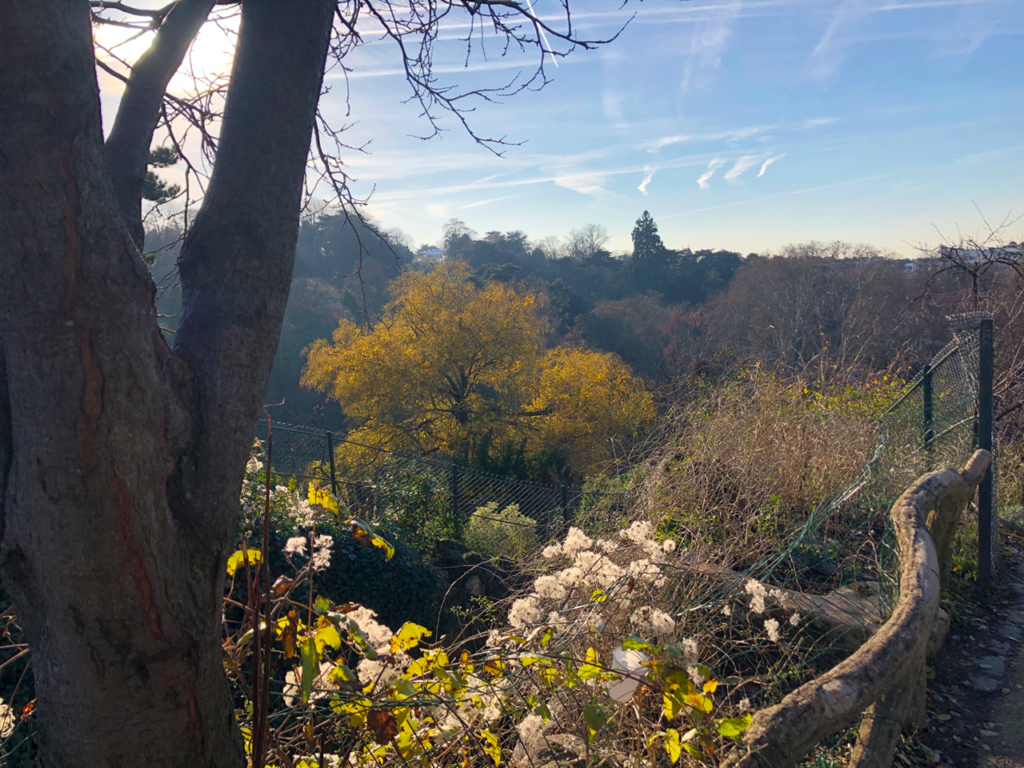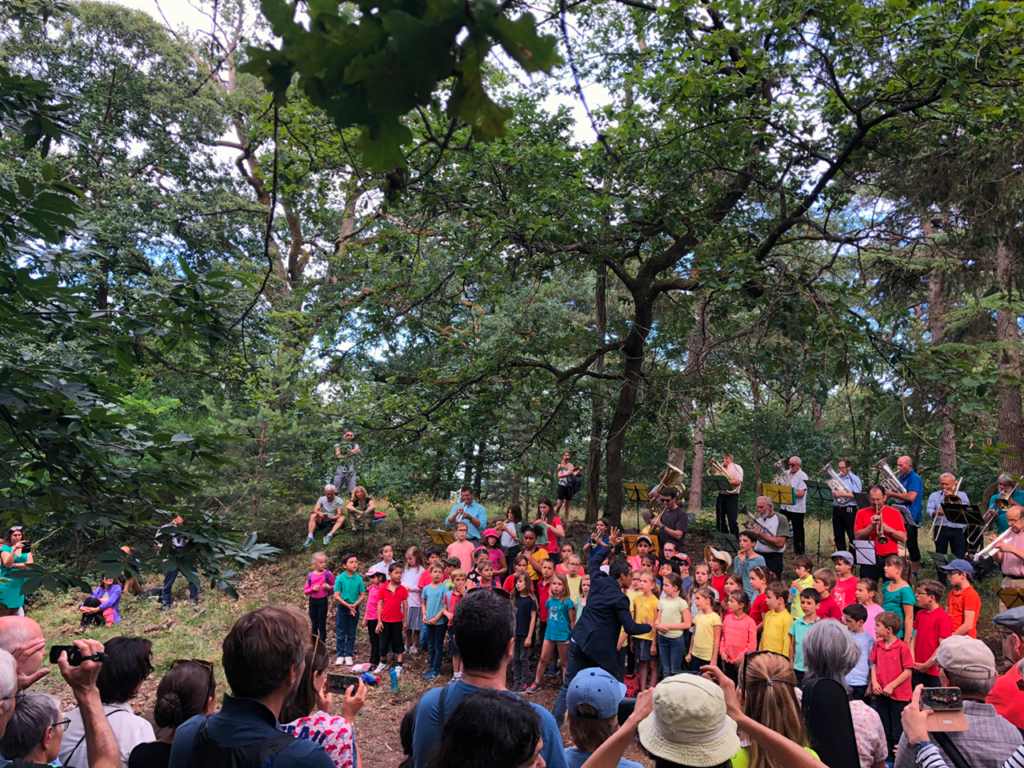It rained, and we walked out. It wasn’t as dark anymore, and the sun was coming and going in between clouds, making every surface shine with the intensity of a cellophane-wrapped reality. But what hit us most was a new, pervasive scent; boy, had the smell changed within a few minutes!
Previous smells—essential oils coming from sundried high-desert trees, freshly cut grass, a row of garbage bins along the tree-covered sidewalk out for pickup— had given way to an even more pronounced scent, a smell of rain. But it wasn’t any rain scent; it was a particular one, a smell that brought up some memories of summer moments spent in the Rockies back when the children were toddlers.
We were near Bend, in the Oregon high desert, but for a moment, we felt we were at a friend’s comfortable log house near Sunriver, Idaho. Even the scent and leaf-giggling of the aspen trees increased the immersive feeling of relatedness.
Us and pop culture’s multimedia formats
We perceive the world through different senses, but pop culture’s evolution has increased our dependence on multimedia experiences (mainly visual and auditory) to relate to the world. At best, our multimedia reductionism is a poor version of our complex way of sensing and relating to Nature and the world.
Senses are also a byproduct of evolution. Organisms don’t just “have” markers, but they “produce” markers (chemical, auditive, biodynamic) to leave signals that have a meaning. For example, plants use odors, morphology, and color to attract pollinators and other organisms that help them spread. Other markers signal an organism’s dangerous venom to potential predators, for instance.

We may have forgotten why we “feel” the transformation of an entire landscape when there are predator animals around or when a storm, a fire, or a sandstorm, transform in record time what we perceive in front of us, but we sense our species has the sensory ability to subtract important information from such events.
On the shoulders of giants —for good and bad
Wired by narrative, we can’t escape one of the metaphors that the tech zeitgeist associate with innovation: whether we like it or not, we’re standing on the shoulders of giants —we profit from previous breakthroughs to create better conjectures and build new things.
There’s a catch-22: we also are inescapably standing on the shoulders of giants when we conceptually interpret reality, name things, or even behave in a certain way. We inherit sophisticated, intricate prejudices we mistakenly take as an unbiased part of reality.
Consider, for instance, our dependence on the conceptual world unleashed by Aristotle (and the thinkers he influenced that didn’t dare to question his preconceived beliefs). The way we see the world carries the weight of our time but also that of culture, whether inherent in our surroundings or learned through social institutions such as families, congregations, education, work, and entertainment.

Philosophers have to deal with the fact that “presence,” or our understanding of the reality of “what’s happening” (our “now”), corresponds only with what our senses and mind are processing at any given moment because Aristotle thought this made sense. And it did back then; over two millennia after, though, new philosophical and scientific conjectures bring a more complex picture of what “reality” is for us at any given moment.
If you think this diatribe about the concept of “presence” in Aristotle is irrelevant to us, it’s still influencing how we design artifacts such as immersive virtual reality and the metaverse. Philosophy has never been more strategic.
Improving upon a key thinker: Aristotle’s long shadow
In his Physics, Aristotle defines time as the movement of events in respect of before and after, or “present-at-hand,” at best a reductionist way to consider what happens to us in any given moment since we experience much more than what our senses gather “right now,” as explained by French writer Marcel Proust when the scent of a madeleine dipped in lime blossom tea invokes memories from childhood that had been blocked in the adult narrator until then.
Our presence always comprises more things than mere mechanical perception and can even bring the essence of remembrances or conceptual artifacts we can barely adequately describe but “feel.” In this respect of who we are “right now” and how we experience reality, we are still stuck with Aristotle once more since it was he who enumerated and described the five senses we still culturally accept.
Aristotle believed there are five senses. Following his straightforward reasoning as one of the most significant contributors to the birth of logical thinking, to him, reality was what it looked like to our senses: A is A. He distinguished five senses, each one with its marked perceptible properties. Sight, hearing, touch, taste, and smell were the channels in which humans gather knowledge, a convincing hypothesis that was accepted by philosophy and religious dogma across different eras and by science. Until recently, that is.
More than five senses: how we experience reality
In recent years, biology and neuroscience have brought a more complex picture of the complex sensory phenomena feeding what we call experience. Barry C. Smith works at the Centre for the Study of the Senses at the University of London; in an interview conceded to Joe Humphreys from The Irish Times, Smith explained how “armchair philosophers who ignore biology and neuroscience are missing fundamental facts about our experience.”
Aristotle said there were five senses, and we have been culturally stuck with it —and, according to Smith, with a thought experiment in philosophy conducted in the late 17th century by Irish writer William Molyneux in a letter dated July 7th, 1688, and addressed to enlightenment thinker John Locke.

In the so-called “Molyneux’s Problem,” a man born blind has learned to distinguish a globe from a cube by holding both objects in his hands. If the man’s sight is restored, can he distinguish the globe from the cube by looking at both figures but not touching them? There’s no consensus yet on the proper scientific answer to Molyneux’s Problem, but science has advanced in many other things related to the way we experience the world.
Locke wasn’t sure how to solve the problem, despite trying to do so in later editions of the influential An Essay Concerning Human Understanding. He was surer about the overall simplistic understanding of Aristotle concerning presence:
“To think often and never to retain it so much as one moment is a very useless sort of thinking.”
Senses we haven’t described nor culturally defined
As anybody impacted by a severe case of Covid-19 since the beginning of the pandemic, just experiencing a sudden impairment of senses we culturally consider “secondary,” such as smell and taste, can transform our everyday endeavors to the point of experiencing something close to what Kierkegaard considered our predisposition to fall for existential angst.
To suggest the actual complexity of our “senses” when it comes to something as given for granted as taste and smell, Barry C. Smith, a wine enthusiast, remarks that experiencing wine is as related to taste as it is to smell or even sight (some experiments show that artificially colored white wines end up relating more to what we expect from drinking white wine, which brings the relation between experience and “all” senses again, the ones recognized and unknown to Aristotle).
If we want to overcome reductionism in how we explain how we experience the world, how many senses are there then?
According to Barry C. Smith, “there could be anything between 22 and 33.” It doesn’t sound accurate and reminds us of how difficult it is to express discoveries hinting at phenomena we have ignored or considered irrelevant.
Agency over our limbs
Our biomechanics are complex and interconnected, but they seem to work without self-perceived “thinking,” hence its historical relegation in philosophy and biology. During Renaissance, painter Leonardo da Vinci and humanist Michael Servetus, among others, studied animal and human corpses to understand the intricacies of anatomy and its effects on what we call biomechanics, which Servetus paid with prosecution by the Roman Catholic Church for heresy.
Now we know that there is a sense of balance (that is intricately connected to our auditive system and to temporary or severe impairments that can cause dizziness and motricity issues). Our perceptual world becomes a nightmare when our sense of balance is compromised.

Another sense is proprioception, also known as kinesthesia: our nervous system can figure out the sense of movement, action, or location and manages the complex coordination of all our muscles and articulations:
“If you close your eyes now you know where all your limbs are without looking at them or touching them.”
Maintaining balance requires the innate input from different sensory systems, including the vestibular (auditory system in vertebrates), the somatosensory (neural structure in the brain and body that allows us to perceive ambient changes such as touch, humidity, pressure, etc.), and our vision.
Senses and the fabric of reality
We can also be very difficult to trick, and technology is nowhere close yet to making us feel completely “immersed” in the metaverse, that will need to consider much of the sensorial information eluded by (or simply unknown to) Aristotle:
“You’ve also got somewhat unusual senses. The sense of effort: if you go to lift a cup of tea, but somebody had replaced it with a perfectly good replica in polystyrene, you would just throw it over your shoulder. There is a sense of effort needed to actually heft something, to lift it or manipulate it.”
And, how about the sense of agency? When we reach for something in front of us, we process, “I reach for this object.” We know it’s a sense because some people with neurological damage can’t relate to such actions in an “authentic” way:
“[They] will sometimes find their arm going out and picking up a cup, and they say ‘I didn’t do that’, and of course, they did, their brain is executing that maneuver but if they’ve lost their sense of agency… it doesn’t feel like their action.”
Phenomena such as the feeling of having the sensation that we have already experienced something (déjà vu), suggest that our sensory system also works as a mechanism to store (and reduce) information we perceive “in the background” thanks to split perception: sometimes we perceive things without giving complete attention to them.

British physicist David Deutsch tries to develop a plausible explanation of the way we choose to perceive reality, “deciding” rather automatically where to set the focus of attention to “save bandwidth,” in his 1997 essay The Fabric of Reality.
Proustian tea
We have ignored many more “senses” since we haven’t culturally developed ways to isolate and describe such phenomena. More than their abstract definition, it’s their complex combination when we experience reality that makes them important to what philosophers call “being in the world,” or, put simply, authenticity. Barry C. Smith:
“Once you start to add all these together you realize there is a symphony of senses, and they are often so well-orchestrated with each other that we don’t notice their operation. We don’t realize they are permanently at work.”
Our inability to describe how rich, intricate, and relatable reality feels, has powered our need for metaphysical thought and artistic expression.
As with memorable experiences (like Marcel Proust’s time portal via the sight, scent, taste, and otherly “perception” of a madeleine soaked in aromatic tea), a poem, a painting, a sculpture, a melody (or their combination in movies, videos, videogames), can bring backlinks we didn’t know we have to experience an expanded reality, one that seems to tap into the past and speculate with the possibilities of what is yet to come.